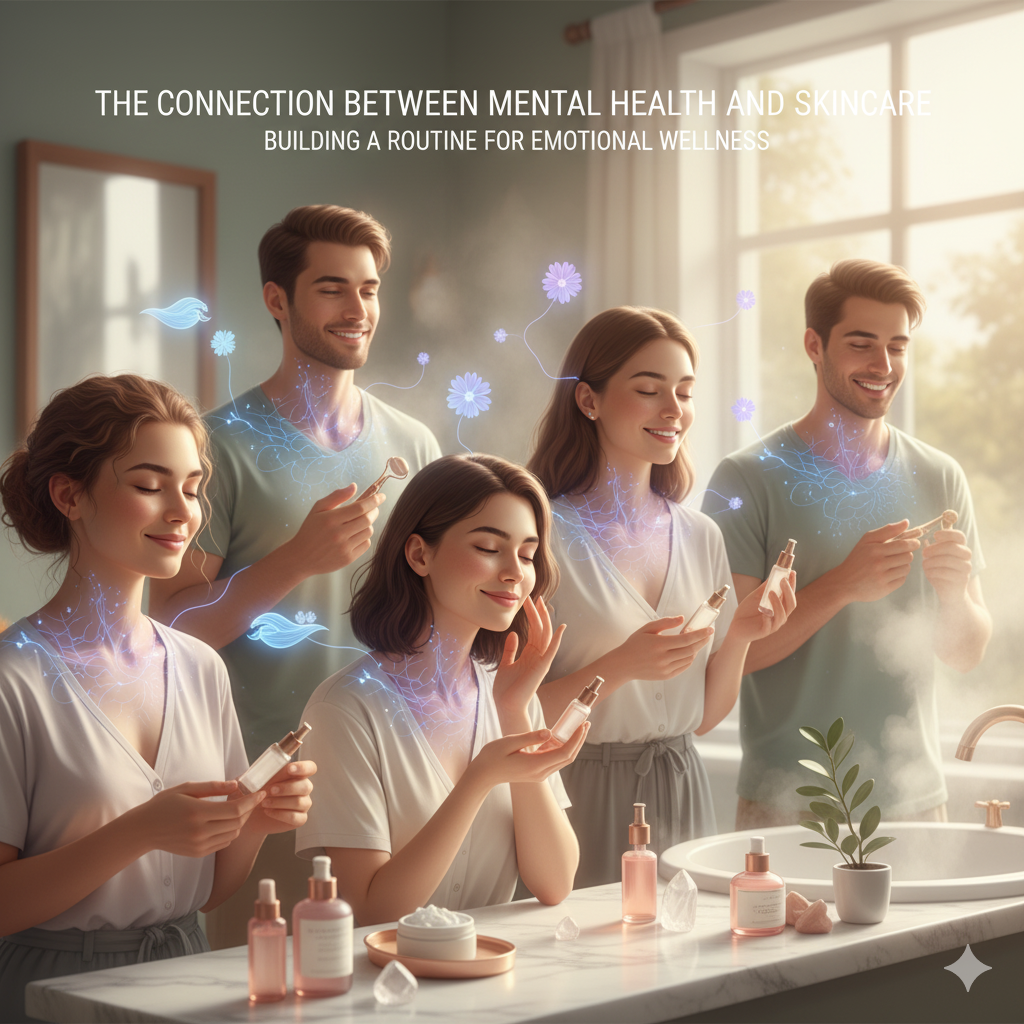In today’s fast-paced, high-stress world, skincare is no longer just about beauty—it has become a therapeutic practice that nurtures both the body and the mind. Our skin is the largest organ of the body, but it is also the most visible, making it a mirror that reflects our inner emotional state. Stress, anxiety, and depression don’t just affect our mental health; they often show up physically on our skin in the form of breakouts, sensitivity, dullness, or even premature aging.
As a result, people around the world are beginning to embrace skincare not only as a way to enhance their appearance but also as a powerful ritual of self-care and emotional wellness. In fact, mental health experts and dermatologists now recognize the skin–mind connection as a growing area of study, often referred to as psychodermatology.
This article takes a deep dive into the connection between mental health and skincare. We’ll explore how stress and emotions affect the skin, why a skincare routine can act as therapy, and how to build a personalized routine that supports both mental and emotional wellbeing. By the end, you’ll see that taking care of your skin is not vanity—it’s a form of self-love.
1. The Science: How Mental Health Impacts Skin
Our skin and brain are more connected than we realize. They originate from the same embryonic tissue in the womb, which is why emotions often manifest physically through the skin. For example, when you blush from embarrassment, sweat from anxiety, or break out during a stressful week, that’s your brain and skin talking to each other.
Stress and Cortisol
When you’re under stress, your body releases cortisol, the stress hormone. Cortisol increases oil production in the skin’s sebaceous glands, which can lead to clogged pores and acne breakouts. It also triggers inflammation, which worsens skin conditions such as eczema, psoriasis, and rosacea.
Anxiety and Sleep Disruption
Anxiety often disrupts sleep, leading to dark under-eye circles, puffiness, and a tired complexion. Sleep is when the body repairs itself, producing collagen and replenishing skin cells. Without it, skin looks dull and ages more quickly.
Depression and Neglected Self-Care
Depression can lower energy levels and motivation, causing people to skip basic skincare routines like cleansing or moisturizing. Over time, this can lead to dehydrated, irritated skin.
Psychodermatology: The Skin–Mind Connection
The emerging field of psychodermatology studies how psychological factors affect skin health. Research shows that reducing stress through therapy, mindfulness, or self-care routines can significantly improve skin conditions. In other words, calming your mind can calm your skin.
2. Skincare as a Form of Self-Care Ritual
A skincare routine is more than just applying products. It can serve as a grounding ritual that brings calm, order, and mindfulness to your day. In a world where many things feel beyond our control, having a small routine that we stick to can create stability and peace of mind.
Mindful Moments in Daily Care
Simple acts such as cleansing your face, applying moisturizer, or massaging your skin can be deeply soothing. The tactile sensation of touching your skin with care signals to your brain that you are safe, loved, and nurtured.
A Break from Stress
Taking 10–15 minutes for skincare gives you permission to pause from digital screens, work stress, or emotional burdens. This short window becomes your personal sanctuary.
Confidence and Self-Image
Clear, glowing skin can boost self-confidence, which positively influences mental health. Conversely, poor skin health can create feelings of self-consciousness. A consistent routine helps balance both the skin and the mind.
3. Building a Mental-Health-Friendly Skincare Routine
You don’t need 12 complicated steps to care for your skin and emotions. In fact, simplicity is key when your mental health feels fragile. Here’s how to create a routine that supports both emotional wellness and skin health.
Morning Ritual: Start with Energy and Positivity
- Gentle Cleanser – Refresh your face and wash away excess oil.
- Hydrating Toner or Mist – A quick spritz feels uplifting and cooling.
- Moisturizer – Lock in hydration with soothing textures.
- Sunscreen – Protection is self-care; SPF prevents damage and aging.
Tip: Take 2–3 deep breaths while applying your moisturizer to start your day with calmness.
Evening Ritual: End with Calm and Comfort
- Double Cleanse – Remove makeup, dirt, and stress from the day.
- Serum or Treatment – Choose calming ingredients like niacinamide or hyaluronic acid.
- Moisturizer or Night Cream – Nourish your skin overnight.
- Facial Massage or Gua Sha – Relieve tension in jaw and facial muscles.
Tip: Use aromatherapy oils like lavender or chamomile to enhance relaxation.
Weekly Self-Care Boosters
- Face Masks – Clay masks for detox, sheet masks for hydration.
- Exfoliation – Gentle exfoliation for renewal, but don’t overdo it.
- Scalp and Hair Care – A scalp massage doubles as stress relief.
4. Products That Support Emotional Wellness
The products you choose can play a role in your emotional experience. Look for textures, scents, and formulas that bring you comfort.
- Aromatherapy Skincare: Products infused with lavender, rose, or citrus oils can enhance mood.
- Soothing Textures: Creamy moisturizers, silky serums, or cooling gels provide sensory relaxation.
- Hydrating Mists: Keep a facial mist at your desk for a quick mood and skin refresh.
Remember: Skincare isn’t just about function—it’s also about how it makes you feel.
5. Holistic Self-Care Beyond Skincare
Beautiful skin doesn’t exist in isolation. Your mind, body, and lifestyle all influence how your skin looks and feels.
Nutrition for Skin and Mind
- Omega-3 fatty acids (salmon, walnuts) reduce inflammation.
- Leafy greens and antioxidants support collagen production.
- Hydration improves elasticity and brain function.
Stress Management Practices
- Meditation & Breathing: Calm the nervous system.
- Yoga or Exercise: Boost circulation, improving skin glow.
- Journaling: Release emotions instead of holding them in.
Digital Detox
Blue light from phones and laptops not only harms sleep cycles but can also contribute to skin damage. Taking breaks helps both your mind and skin reset.
6. The Psychological Benefits of Skincare
Skincare isn’t only about the physical results—it offers deep psychological benefits.
- Routine Creates Stability: In times of chaos, a skincare routine becomes an anchor.
- Self-Esteem Booster: Taking care of yourself fosters confidence and self-worth.
- Touch as Therapy: Gentle self-touch during application reduces anxiety and promotes calm.
- Symbol of Self-Love: Skincare becomes a daily affirmation that you are worthy of care.
7. Embracing Age-Positive and Realistic Beauty
One of the mental health traps of the beauty industry is the obsession with perfection. A healthier approach is to embrace age-positive beauty—celebrating your skin at every stage of life. Skincare should be about feeling good, not chasing unrealistic standards.
By reframing skincare as self-care rather than a fight against aging, we reduce stress and cultivate gratitude for the body we live in.
8. Conclusion: Skincare as Emotional Wellness
Skincare is far more than creams, serums, and masks. It’s a ritual of love, a mindful pause, and a tool for emotional healing. The connection between mental health and skin is undeniable: when the mind suffers, the skin shows it; when the skin is nurtured, the mind often heals too.
By building a simple, soothing skincare routine, we create daily moments of calm, stability, and self-appreciation. Pairing this with holistic practices—nutrition, rest, mindfulness—leads to a healthier, more radiant you inside and out.
So the next time you cleanse your face or massage in moisturizer, remember: you’re not just taking care of your skin—you’re also caring for your soul.









